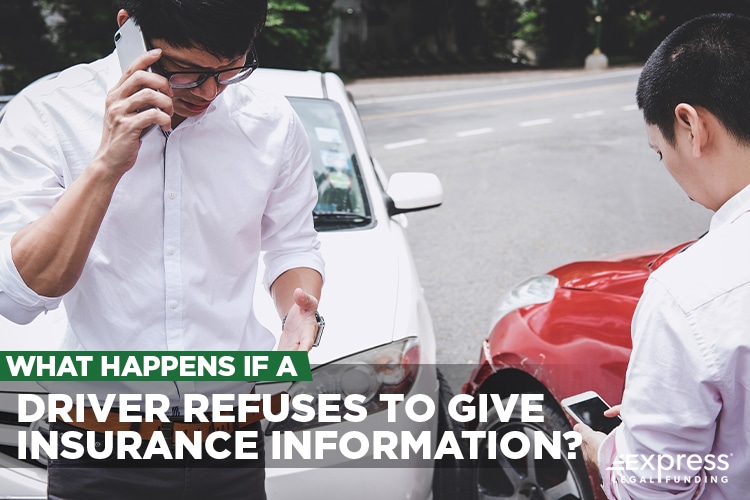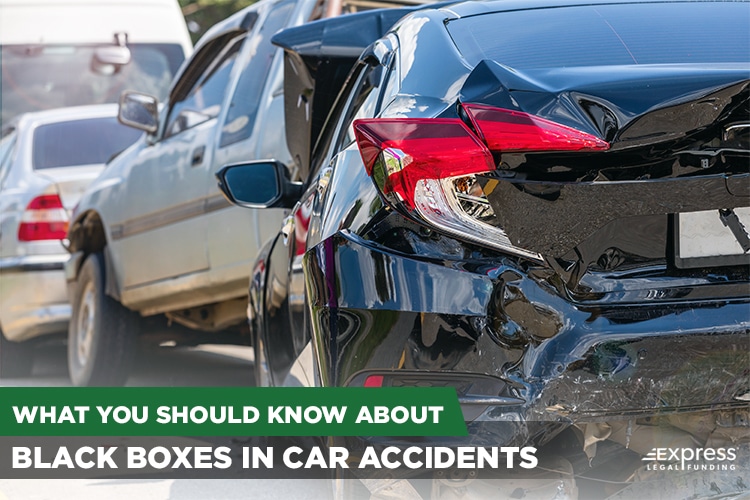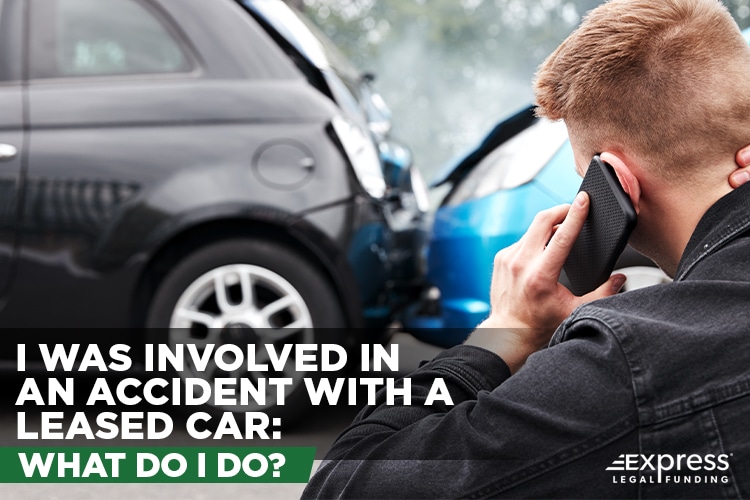
Getting into a car accident is already stressful, but when the other driver refuses to share their insurance information (standard procedure), it can add a whole new layer of frustration. Knowing what to do in this situation can make all the difference.
This guide explains the essential steps to protect yourself legally and financially if the other driver refuses to cooperate by providing insurance details.
From calling the local authorities to understanding your rights and next steps, we’ll walk you through everything you need to know and do to ensure that your claim isn’t compromised by someone else’s lack of cooperation in the immediate wake of an auto accident.
Is It Illegal to Refuse to Give Insurance Details?
Yes. In most states it is illegal for a driver to refuse to provide insurance following an accident, especially when they are the driver at fault for causing the accident.
Failing to do so can result in legal consequences for them, like fines or even being charged with a hit-and-run, depending on the case’s circumstances.
Why Would a Driver Refuse to Provide Insurance Information After an Accident?
Now, you might be wondering why any driver would refuse to provide their insurance information following an accident. After all, it is the proper procedure for them to give the information so you can proceed with filing a claim.
However, there are several reasons why a driver would be hesitant to provide their insurance information even though they do not have a genuine choice.
Generally, when drivers refuse to provide their insurance information, they hope to avoid consequences. There is rarely a legitimate reason not to give that information.
Now, you might be wondering why any driver would refuse to provide their insurance information following an accident.

Among the most common reasons a driver would avoid providing their information is because they do not have insurance. Since driving without insurance is illegal, they would be very keen to avoid confessing to such. However, other reasons can be just as compelling for them to fail to provide information even if they have it.
- They have high insurance premiums, and an insurance claim would raise their higher rates even higher.
- They are driving a vehicle they do not own and are thus technically not covered.
- They are driving on an expired or suspended license.
- They are driving under the influence of alcohol or a drug, which impairs their ability to operate a motor vehicle safely.
While none of these reasons are justified, it will make the idea of providing insurance information an unappealing prospect.
Regardless of the other driver’s reasoning for withholding their insurance information, you are left with the arduous task of determining the next step. Fortunately, even when a negligent driver refuses and fails to provide insurance information, you have options available to you.
What to Do if the Other Driver Refuses to Give Insurance Information?
- Contact the Authorities: Immediately call the police to report the incident. An official report will document the other driver’s refusal to share insurance information and support your claim.
- Gather and Document Evidence: Collect as much information as possible at the scene, including photos of both vehicles, the license plate, and any visible damage. Witness contact details can also be valuable.
- Notify Your Insurance Company: Inform your insurer about the accident promptly, especially if the other driver is uncooperative. They can guide you through the next steps and help with any uninsured motorist claims if needed.
- Consult an Attorney for Legal Advice: Consider seeking a free consultation with a car accident attorney. An attorney can protect your rights, assist in gathering evidence, and manage any challenges with the other driver’s insurance—or lack thereof—to help you pursue compensation.
Contact the Authorities
If your vehicle is hit by another car and the driver refuses to provide insurance details, one of the most effective steps is to contact the authorities immediately.
Today, with nearly everyone carrying a mobile phone, reaching your local police is both easy and essential in handling uncooperative drivers.
In many states, contacting the police after an accident is not just recommended but mandatory. Law enforcement will help document the incident and enforce the exchange of information, especially when one driver refuses to comply.
When officers are called to the scene of an accident, they have the authority to ensure that the other driver provides their insurance information as required by law, preventing any complications in your claim process.
Having police assistance protects you legally and financially, ensuring you aren’t left to deal with the damages alone.
With their support at the scene creating an accident report, you can feel confident that you are taking the proper steps to have your rights upheld and strengthen your insurance claim.

Unfortunately, relying on law enforcement to compel insurance information from all drivers has a flaw. It is predicated on the other driver remaining at the scene of the accident and not fleeing.
This risk is why, following the accident, you need to go into ‘observation mode’ immediately. What does this mean?
Gather and Document Evidence
Take note of specific information regarding the other driver’s vehicle. For example, get a photo of or write down the license plate number and state, and the car’s color, make, model, and year.
This information will give the police the information they will need to track down the other driver for their contact information. This process will happen even if the other driver flees the accident scene to avoid providing insurance information and having to remain culpable for the accident.
Police officers have access to the DMV database and the ability to look up the address of a vehicle’s owner from their license plate. They may even be able to get access to their phone number and give them a call.
If they investigate a hit-and-run and visit the vehicle owner’s house, they may find the car parked out front with collision damage that fits your story.
This example is why it’s always important to take photos or take note of their license plate if possible, even if you cannot get the driver’s license number or the driver’s information.
Law enforcement involvement will not always solve your problem, though, especially if you couldn’t get a clear look at the vehicle or the license plate.
As a result, you will likely be forced to take other steps to ensure that the driver at fault is brought forward to be held responsible for the accident.
Notify Your Insurance Company
Call your insurer as soon as possible. Many companies have 24/7 claim lines or apps to make reporting convenient. Delaying can affect your ability to file a claim, as many insurers require prompt notification of an accident.
When speaking to them, explain what happened, stick to the facts, and avoid making assumptions about fault or liability. Mention if the other driver refused to share insurance details, as this may impact the type of claim you need to file (e.g., an uninsured motorist claim).
Your car insurance company will guide you on the next steps, such as scheduling a vehicle inspection or completing paperwork. They may also suggest you seek a medical evaluation if there are any injury claims.
Make a record of the claim number, adjuster contact details, and communications you have with your insurer. This will help you track your claim’s progress and follow up if needed.

Consult an Attorney for Legal Advice
A personal injury attorney or car accident law firm can help navigate complex insurance and legal processes, such as obtaining necessary documents, accessing police reports, and dealing with uncooperative parties.
They’ll assess your case, advise you on potential compensation, and handle negotiations to maximize your claim.
If a lawsuit becomes necessary, a lawyer will file a personal injury claim, helping ensure you’re not left financially burdened due to another driver’s negligence or lack of insurance.
Dealing with Uninsured Drivers and No-Fault Insurance Policies
Are They Uninsured?
One reason a driver might refuse to provide insurance details is that they don’t have an active policy. Some drivers even try to present outdated insurance cards from previous providers, knowing the coverage has lapsed. When you contact the supposed insurer, they may confirm that no coverage exists because the driver is uninsured.
If you have an active auto insurance policy with uninsured motorist coverage, notify your insurance company right away.
This coverage allows your insurer to step in and cover the damages the other driver’s insurance would have paid, ensuring you aren’t left with financial burdens from an uninsured driver’s negligence.
Your insurer will also work with you to verify that the at-fault driver lacks insurance. In some states, such as Missouri, driving without insurance can lead to penalties like license suspension.
However, penalties for the uninsured driver may not translate into compensation for your damages or injuries, leaving your uninsured motorist coverage as your primary recovery option.
If neither you nor the at-fault driver had valid insurance, you may want to consider suing the other driver directly. However, a successful lawsuit against an uninsured driver is rare, especially if they can’t afford insurance to begin with.
Even with a judgment, your recovery may be limited (if the defendant lacks any money to sue for) to placing a lien on the driver’s property or, in rare cases, collecting from any assets they might have on hand. It’s also important to note that filing a lawsuit is typically only possible in non–no-fault states.

What Are No-Fault States?
In no-fault states, drivers generally rely exclusively on their insurance for accident-related expenses, regardless of who was at fault.
This means you file claims through your own insurance provider for vehicle repairs, replacement costs, and medical bills rather than pursuing compensation from the other driver’s insurance.
This policy limits lawsuits against at-fault drivers for minor injuries and limits the recovery amount to what is provided by each driver’s personal injury protection (PIP) coverage, allowing cases to be processed faster due to reduced need for investigation of fault.

There are only a small handful of no-fault states, including:
- Florida
- Hawaii
- Kentucky
- Massachusetts
- Michigan
- Minnesota
- New Jersey
- New York
- North Dakota
- Pennsylvania
- Utah
Suing an uninsured driver is an option, but it’s often not fruitful if the driver lacks sufficient assets or financial resources to cover a judgment. This makes recovery through uninsured motorist coverage more practical in many cases.
While living in a no-fault state, if the other driver provides you with their insurance information, they are still obligated to remain on-scene until the police allow them to leave. That said, keeping them on-scene is not your responsibility.
Closing Statements About Drivers Refusing to Give Insurance Details After Accidents
Being involved in a motor vehicle accident is challenging enough, but it becomes even more frustrating when the other driver refuses to share essential information needed for a personal injury claim.
In these situations, it’s important to follow safe and legal steps by involving law enforcement. Always gather information about the other driver in the presence of police officers to avoid unnecessary conflict.
If the driver leaves the scene, report the incident to authorities and allow them to handle the situation safely.
After notifying the police, let your injury attorney guide you through the process.
An attorney can handle the legal details on your behalf, giving you peace of mind to focus on recovery. Be sure to prioritize your health and seek immediate medical treatment as needed.
Express Legal Funding: Pre-Settlement Support for Car Accident Victims
During this time, you may still need to cover essential living expenses such as rent, groceries, restaurant dining, and utilities.
That is where we can come in at Express Legal Funding to help manage these costs while your claim progresses with our pre-settlement funding services.
We can give you immediate cash to cover everyday expenses while your attorney navigates your personal injury case. Best of all, you only have to repay the advance if you win or settle, making it a risk-free option to help ease financial pressure.
Contact us today to apply and learn how pre-settlement funding can be a good option for you.
FAQs About Handling Uninsured Drivers and No-Fault Claims

What should I do if the other driver refuses to give me their insurance information?
If the other driver refuses to provide insurance details, stay calm and document as much information as possible, including the vehicle’s license plate number, make, model, driver’s license number, and any other accident scene details.
Contact the police to file an official report, which can help verify the incident and may compel the other driver to share their insurance coverage and other driver’s information. This report is often essential when dealing with the driver’s insurance company.
Can I still get compensation if the other driver is uninsured?
Yes, if you have uninsured motorist coverage as part of your auto insurance policy, your insurer can cover your damages as if they were the other driver’s insurance company. This typically includes property damage, medical bills, and other expenses related to the accident.
What happens if I don’t have uninsured motorist coverage?
If neither you nor the other driver has valid insurance coverage, you may consider filing a lawsuit against the at-fault driver. However, this can be challenging if they lack assets. In no-fault states, you would rely solely on your own insurance for coverage.
What is a no-fault state, and how does it affect my claim?
In no-fault states, each driver’s own insurance company covers their accident-related expenses, regardless of who caused the accident. This system limits your ability to sue the other driver unless the injuries are severe or meet specific criteria.
No-fault states include Florida, Michigan, and New York, among others.
Can I sue an uninsured driver for damages?
In most states, you can sue an uninsured driver for damages, but collecting compensation may be difficult if they have limited assets. In no-fault states, lawsuits against the other driver are restricted for most accidents, so you may need to rely on your own insurance for recovery.
Why is it important to document the other driver’s vehicle details?
Documenting the other driver’s vehicle details, like the license plate number, make, model, and color, as well as the driver’s license number, if available, can help law enforcement track down the driver if they leave the scene or refuse to provide their insurance information.
This documentation is crucial if you need to file an accident claim with the driver’s insurance company or if there’s a hit-and-run investigation.
What penalties might the other driver face for not having insurance?
In many states, driving without insurance can result in penalties such as fines, license suspension, and, in some cases, vehicle impoundment. These penalties, however, don’t provide direct compensation to you, which is why having uninsured motorist coverage can be essential.
How does uninsured motorist coverage work?
Uninsured motorist coverage acts as a safety net if the other driver is uninsured or underinsured. It covers your medical expenses, vehicle repairs, and other losses that the at-fault driver’s insurance would have covered if they were insured.
What if the other driver gives me outdated insurance information?
If the other driver gives you outdated or lapsed insurance information, your insurer can still help. Report the incident, and your insurance company may reach out to verify the other driver’s insurance information.
If the other driver is indeed uninsured, your uninsured motorist coverage can kick in.
When should I contact my insurance company after an accident?
It’s best to contact your own insurance company as soon as possible after an accident, especially if the other driver is uncooperative. Prompt notification helps preserve your right to file a claim and allows your insurer to begin their investigation.
Should I hire a car accident attorney if the other driver refuses to give their insurance information?
Yes, hiring a car accident attorney can be highly beneficial if the other driver refuses to share their insurance information. Most car accident attorneys offer free consultations, allowing you to ask them questions about your case and understand your options at no cost.
Once hired, they can help gather necessary evidence, obtain police reports, and protect your rights throughout the claims process.
These personal injury lawyers can also assist in dealing with uncooperative drivers and their insurance companies, making it easier to pursue compensation for damages or injuries.
How can a car accident attorney help if the other driver is uninsured?
If the other driver is uninsured, a car accident attorney can guide you on filing an uninsured motorist claim with your own insurance company, provided you have that coverage.
They can help you understand your policy limits, negotiate with your insurer, and, if necessary, explore other legal options to recover damages. An attorney’s expertise can be crucial in navigating complex insurance claims and maximizing your compensation.



